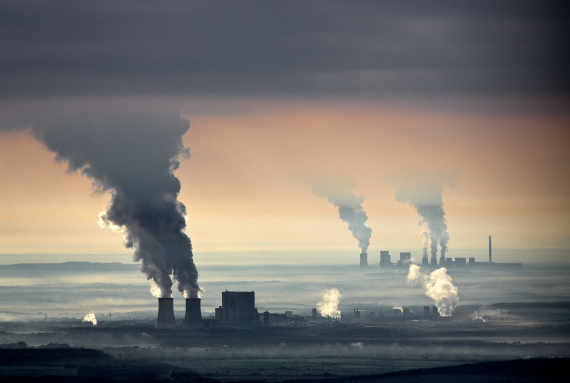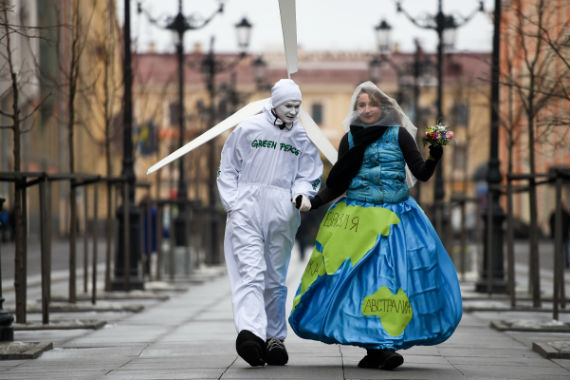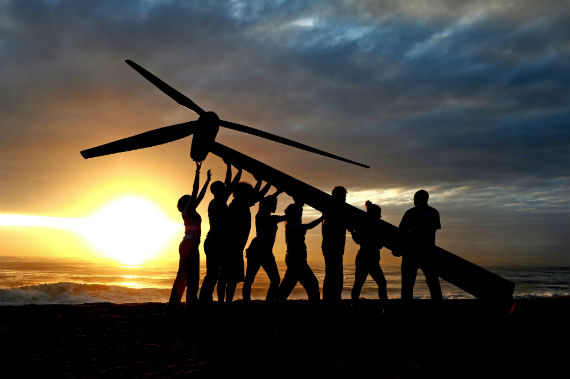When it comes to prosperity, humans seldom care about the environment. But our planet would not have it and there's evidence at hand: the ten hottest years on record have all occurred since 1998. The year 2014 keeps the highest mark now and it's all but guaranteed already that 2015 will claim the infamous title.
Let's be clear, both people and biodiversity already suffer the negative impacts of climate change, whether in the form of unexpected floods in our communities, stronger hurricanes, or changes on habitat for vegetation and wildlife.
So, when will we start to act? Why do we continue to obtain our energy from non-renewable, dirty sources that only make the problem bigger?
Our largest energy sources -- namely fossil fuels -- are taking us down on a path that will lead to a global temperature rise way above what our society and economy can bear. Just to exist, the most vulnerable countries can't even take half of that. Then again, the current rise on temperature averages is already disrupting our lifestyles. This is the gloomy backdrop to the international climate talks in Paris.

Lausitz Brown Coal Plants in Germany
Photo Credit: Paul Langrock/Greenpeace
The world's leaders are meeting in the French capital precisely to agree on a plan that will hopefully keep global warming from further changing the climate and disrupting our lives. So, the big question is: What needs to be done to put us back on track?
First of all, we need them to agree on a just transition from oil, gas, hazardous coal, and dangerous nukes to 100 percent renewable energy sources by 2050. Not only renewable energy prevents further pollution in the atmosphere, it is inherently safer, cheaper, and accessible to all. This path will provide cleaner air and water and keep temperature rises in the safe zone.
According to a recently published report from Greenpeace, 100% renewable energy for all is both achievable and cost-effective, given the right political decisions. There are signs showing a real momentum right now for stepping out of fossil fuels: The UK has just announced to close all coal-fired power plants by 2025. A new OECD deal would cut off financing for 85 percent of coal-fired plants. Shell has stopped its drilling for oil in the Arctic -- and is pulling out of a tar sands project in Canada. And in October, President Obama took a historic decision by rejecting the Keystone XL oil pipeline, citing the need to keep fossil fuels in the ground.
Ahead of the climate talks in Paris, most countries have submitted their intended contributions to a global climate deal, aiming to accelerate national ambitions on taking action. While those contributions could make a real difference, they are still highly likely to exceed the 2°C global warming limit.
That is not only irresponsible regarding the environment, but also a huge social and economic burden plus a failure on our moral obligation. Therefore, those pledges should only be seen as a starting point and not the final level of action we'll see. They need to be reviewed and strengthened in 5-years cycles starting right after Paris.
And there's more that can be done. For example, Costa Rica went on 100 percent renewable electricity for the first 75 days of 2015. Tech giants like Amazon, Google and Facebook, all have laid out road maps that explain how they intend to achieve procurement of 100 percent renewable energy. The solutions are already there, we just have to make use of them.
Since most of us won't have the chance to actually be negotiating at a conference center in Paris, you might ask yourself: What can I really do?
1. Instead of focusing on producing more energy, let's save energy by implementing the most energy efficient devices existing today and switching off unused equipment.
2. Let's push the transition to renewable energy sources by changing our energy supplier or even installing solar panels on our rooftops, investing in wind energy, raising awareness via social media or telling our friends of the benefits of renewable energy.
3. Let's put pressure on our local governments. In India, petitioners have just taken to the Supreme Court in an effort to reduce emissions and boost air quality. We can all make a difference!
4. Show leadership in taking climate action by organizing marches, festivals, showing banners, and signing petitions or creating your own. Get creative!

Global Divestment Day in St. Petersburg
Photo Credit: Dmitri Sharamov/Greenpeace
When your efforts result in a transition from dirty fuels to renewable energy, lives will be better with improved air quality, money will be spent sustainably, and jobs in the green sector will be created. The climate talks in Paris could be a milestone by providing all of us with a valuable, long-term direction to take on the journey; a journey that will continue until we achieve a world with 100 percent renewable energy for all, in a just transition that leaves no one behind.
Let's take responsibility for the world we're living in, for those most affected by the impacts of climate change, and for future generations. Paris is only a stop along the path to a 100% renewable future, not the destination.

Raising a Wind Turbine in Durban
Photo Credit: Shayne Robinson/Greenpeace
This post is part of a "What's Working: Low-Carbon Economy" series produced by The Huffington Post, in conjunction with the U.N.'s 21st Conference of the Parties (COP21) in Paris (Nov. 30-Dec. 11), aka the climate-change conference. The series will put a spotlight on solutions to shifting away from fossil fuels to renewables, and how we can best minimize our output of greenhouse-gas emissions. It is part of HuffPost's What's Working editorial initiative. To view the entire series, visit here.